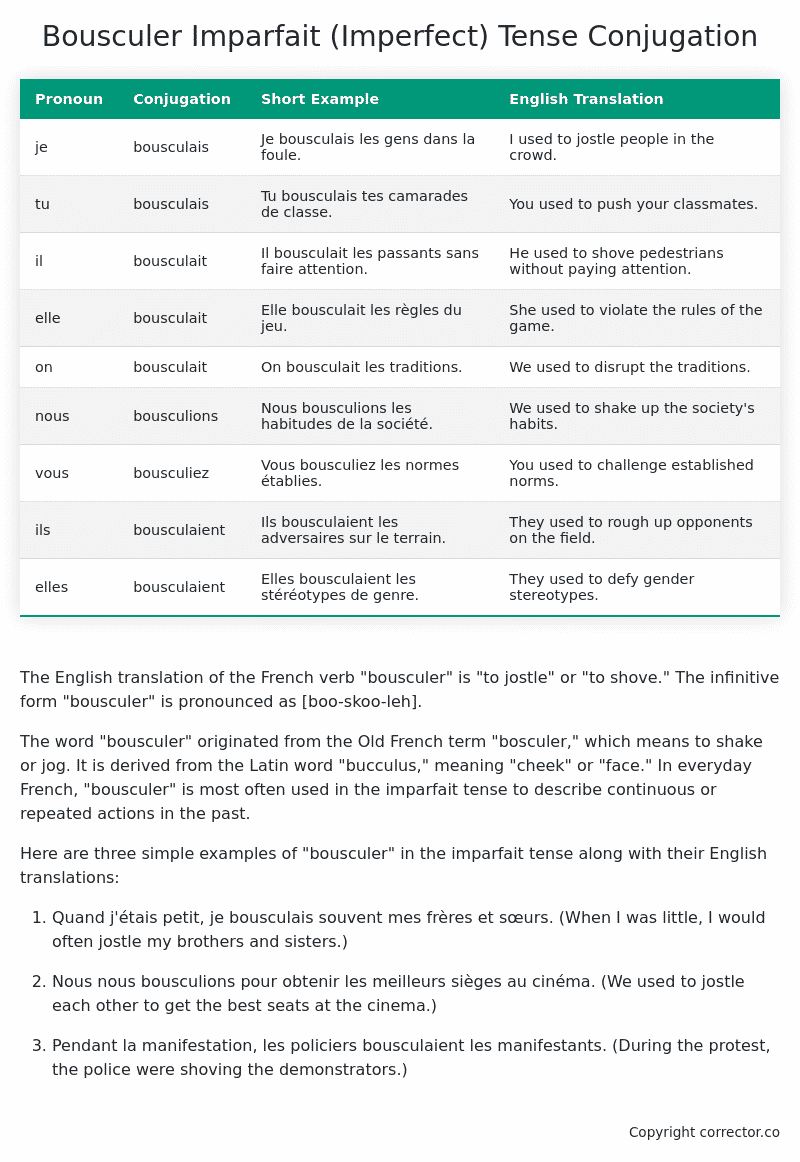Imparfait (Imperfect) Tense Conjugation of the French Verb bousculer
Introduction to the verb bousculer
The English translation of the French verb “bousculer” is “to jostle” or “to shove.” The infinitive form “bousculer” is pronounced as [boo-skoo-leh].
The word “bousculer” originated from the Old French term “bosculer,” which means to shake or jog. It is derived from the Latin word “bucculus,” meaning “cheek” or “face.” In everyday French, “bousculer” is most often used in the imparfait tense to describe continuous or repeated actions in the past.
Here are three simple examples of “bousculer” in the imparfait tense along with their English translations:
-
Quand j’étais petit, je bousculais souvent mes frères et sœurs.
(When I was little, I would often jostle my brothers and sisters.) -
Nous nous bousculions pour obtenir les meilleurs sièges au cinéma.
(We used to jostle each other to get the best seats at the cinema.) -
Pendant la manifestation, les policiers bousculaient les manifestants.
(During the protest, the police were shoving the demonstrators.)
Table of the Imparfait (Imperfect) Tense Conjugation of bousculer
| Pronoun | Conjugation | Short Example | English Translation |
|---|---|---|---|
| je | bousculais | Je bousculais les gens dans la foule. | I used to jostle people in the crowd. |
| tu | bousculais | Tu bousculais tes camarades de classe. | You used to push your classmates. |
| il | bousculait | Il bousculait les passants sans faire attention. | He used to shove pedestrians without paying attention. |
| elle | bousculait | Elle bousculait les règles du jeu. | She used to violate the rules of the game. |
| on | bousculait | On bousculait les traditions. | We used to disrupt the traditions. |
| nous | bousculions | Nous bousculions les habitudes de la société. | We used to shake up the society’s habits. |
| vous | bousculiez | Vous bousculiez les normes établies. | You used to challenge established norms. |
| ils | bousculaient | Ils bousculaient les adversaires sur le terrain. | They used to rough up opponents on the field. |
| elles | bousculaient | Elles bousculaient les stéréotypes de genre. | They used to defy gender stereotypes. |
Other Conjugations for Bousculer.
Le Present (Present Tense) Conjugation of the French Verb bousculer
Imparfait (Imperfect) Tense Conjugation of the French Verb bousculer (You’re reading it right now!)
Passé Simple (Simple Past) Tense Conjugation of the French Verb bousculer
Passé Composé (Present Perfect) Tense Conjugation of the French Verb bousculer
Futur Simple (Simple Future) Tense Conjugation of the French Verb bousculer
Futur Proche (Near Future) Tense Conjugation of the French Verb bousculer
Plus-que-parfait (Pluperfect) Tense Conjugation of the French Verb bousculer
Passé Antérieur (Past Anterior) Tense Conjugation of the French Verb bousculer
Futur Antérieur (Future Anterior) Tense Conjugation of the French Verb bousculer
Subjonctif Présent (Subjunctive Present) Tense Conjugation of the French Verb bousculer
Subjonctif Passé (Subjunctive Past) Tense Conjugation of the French Verb bousculer
Subjonctif Imparfait (Subjunctive Imperfect) Tense Conjugation of the French Verb bousculer
Subjonctif Plus-que-parfait (Subjunctive Pluperfect) Tense Conjugation of the French Verb bousculer
Conditionnel Présent (Conditional Present) Tense Conjugation of the French Verb bousculer
Conditionnel Passé (Conditional Past) Tense Conjugation of the French Verb bousculer
Conditionnel Passé II (Conditional Past II) Tense Conjugation of the French Verb bousculer
L’impératif Présent (Imperative Present) Tense Conjugation of the French Verb bousculer
L’impératif Passé (Imperative Past) Tense Conjugation of the French Verb bousculer
L’infinitif Présent (Infinitive Present) Tense Conjugation of the French Verb bousculer
L’infinitif Passé (Infinitive Past) Tense Conjugation of the French Verb bousculer
Le Participe Présent (Present Participle) Tense Conjugation of the French Verb bousculer
Le Participe Passé (Past Participle) Tense Conjugation of the French Verb bousculer
Struggling with French verbs or the language in general? Why not use our free French Grammar Checker – no registration required!
Get a FREE Download Study Sheet of this Conjugation 🔥
Simply right click the image below, click “save image” and get your free reference for the bousculer imparfait tense conjugation!

Bousculer – About the French Imparfait Tense
NOTE: To take a deep dive into all the French tenses then see our article on Mastering French Tense Conjugation.
Formation of the Imparfait Tense
For regular -er verbs:
For regular -ir verbs
For regular -re verbs
Common Everyday Usage Patterns
Description of Past Habits
Background Information
Mental and Emotional States
It’s employed to express emotions, thoughts, or physical sensations in the past. For example: “J’étais content quand il est arrivé.” (I was happy when he arrived.)
Ongoing Actions
Points to Note About the Imparfait Tense
Passé Composé vs. Imparfait
Conditional
Si Clauses
Narration
I hope you enjoyed this article on the verb bousculer. Still in a learning mood? Check out another TOTALLY random French verb imparfait conjugation!


